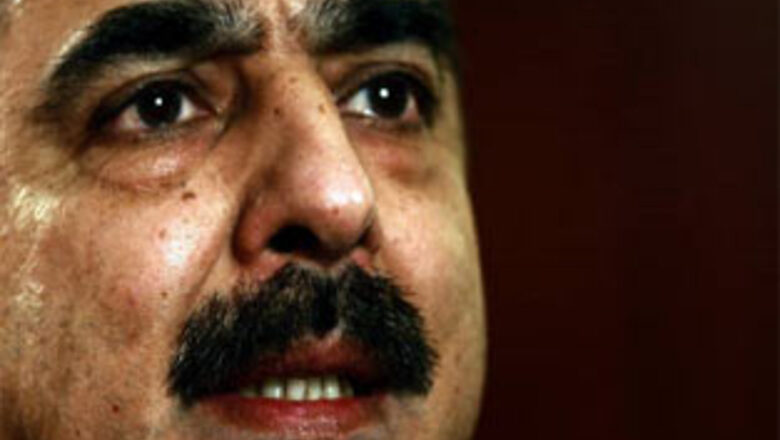
views
Islamabad: International diplomacy was defusing tension with India after the militant attack on Mumbai, and action against militant groups should reassure New Delhi, Pakistani Prime Minister Yousaf Raza Gilani said on Saturday.
Whereas prospects of a military confrontation between the nuclear-armed neighbours has receded in the two weeks since the slaughter of over 200 people in Mumbai, India has said a four-year-old peace process is in jeopardy.
"Normalisation takes time," Gilani told Reuters in an interview.
The United States has been at the forefront of intense diplomatic efforts to stop tension erupting into a full-blown crisis between two countries that have already fought three wars.
"All our common friends and responsible statesmen are playing their important role in defusing the situation and I'm pretty sure that will work," Gilani stated.
He said Pakistan was taking its own action against groups and people put on a UN terrorist list, and the chances of India resorting to air strikes against militant targets were remote.
"I think India is equally responsible and they won't. There is no fear of anything like that," Gilani said.
Indian and US officials have levelled accusations at Lashkar-e-Toiba, a jihadi organisation that fought Indian rule in Kashmir and, according to analysts, has had close ties to the Pakistani military's Inter-Services Intelligence (ISI) agency.
Pakistan began raiding and shutting offices and schools of Jamaat-ud-Dawa (JuD) charity, linked to Lashkar, late on Thursday. Scores of activists have been detained.
The US Security Council had put the charity and its head, Hafiz Saeed, on a list of individuals and organisations linked to al-Qaeda and the Taliban late on Wednesday.
Saeed, who has been put under house arrest, founded Lashkar, but quit it days before Pakistan banned it in 2002, but he stayed as head of the charity, raising funds and drawing recruits.
Saeed and the JuD have said they would go to the courts to remove the restrictions on their activities, the freeze of their bank accounts, and block on their travel.
Having seen the ineffectiveness of Pakistan's past measures, and harbouring suspicion that security agencies have retained links with Lashkar and other groups, Indian officials privately doubt whether any decisive action will be taken this time.
UN BACKING
Gilani said the latest crackdown on anti-Indian jihadi organisations would go beyond previous ineffective bans because UN resolutions gave the government a stronger legal position.
"Now we have to act according to the United Nations resolutions," Gilani said.
The government of General Pervez Musharraf banned Lashkar and Jaish-e-Mohammad shortly after the two groups were blamed for a raid on the Indian Parliament in 2001.
But analysts say those bans were a sham and Pakistan's ISI allowed the militants to thrive in order to unleash them whenever they wanted to unsettle New Delhi.
Gilani said the insurgency in Indian Kashmir was indigenous, "not state-sponsored" and "nothing to do with Pakistan".
Pressed on whether his government would act against armed groups based in Pakistan and fighting in Kashmir, Gilani replied: "Certainly, if Pakistan soil is being used for any such activity, the law will take its own course."
He said India has yet to supply hard evidence of Pakistani links to Mumbai attack, but hoped this would be forthcoming when foreign ministers from both countries meet on Sunday in Paris on the sidelines of a conference on Afghanistan.
Gilani reiterated Pakistan's position that anyone caught in Pakistan would be tried there also, and suspects wouldn't be handed over to India.
"We will go according to our own law," he said. "There is no such thing of handing over to India."
He also set out plans to snap links between Islamic charities and militant groups. He said charitable trusts and schools would be overhauled by the government, new boards of directors formed, and their work would be regularly monitored.
Gilani said the greatest threat to Pakistan was terrorism, and one of the root causes was economic. Faced with an economic crisis, that the International Monetary Fund has papered over last month with a $7.6 billion loan, Gilani said he was looking for multilateral lenders and friendly governments to help Pakistan meet the challenges.
Potential donors are expected to meet next month in a "Friends of Pakistan" conference.



















Comments
0 comment